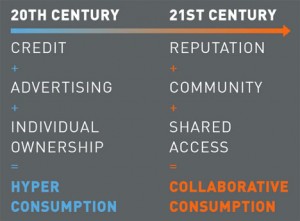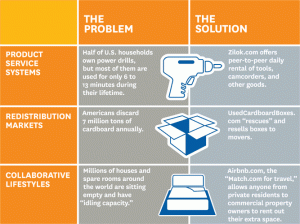Collaborative Economy & New Prosperity
by Francine St.Amand
 The Flood of 2012 wiped out 100+ jobs in the Village of Perth-Andover. To my knowledge, no attempt has been made to replace those jobs. Being an election year, I would urge everyone to hammer out that reminder to politicians.
The Flood of 2012 wiped out 100+ jobs in the Village of Perth-Andover. To my knowledge, no attempt has been made to replace those jobs. Being an election year, I would urge everyone to hammer out that reminder to politicians.
Writing this series on Alternative Employment is not about downplaying the critical need for regular ‘real’ jobs in the here and now. I have a job where I support people looking for work. These people cannot wait for the world to go through a big “new economy” makeover. They have rent to pay, overdue bills and families to feed – NOW!!
IF THERE WAS A WILL, there would be enough jobs here in Perth-Andover and Surrounding Area – that we may actually have to recruit newcomers to fill the need. It’s not like there’s not work to get done around here. What is lacking is the willingness, imagination and courage of doing the intricate work that needs to be done to develop a true ‘local economic plan” – based on real assets, available resources and potential for growth.
Agriculture, for one, would look entirely different than it does now. The Agribusiness/Green Revolution model seems all very outdated now considering the outcry from people all over the world to reform agriculture and the food chain. But government continues to pump money into that model while its citizens continue to under nourish themselves on crappy diets. Eating used to be a pleasurable activity – now it’s something that requires a lot of research and a leap of faith.
 So even though JOBS, (regular jobs), are critically needed to keep a large number of people from sliding into the abyss of irreversible poverty, I think it’s important to keep abreast of what is happening in the areas of Alternative Employment, The New Prosperity and Shared Economy. It’s a paradigm shift in values which I never thought I would live to see the day when it would emerge. And it’s the younger generations that are driving this shift – because they know it’s their means for survival AND for the planet’s survival. They are charting their own waters that flies in the face of values based on greed, dominance, unbridled consumerism and of course, mistrust. The 1% have made billions on mistrust.
So even though JOBS, (regular jobs), are critically needed to keep a large number of people from sliding into the abyss of irreversible poverty, I think it’s important to keep abreast of what is happening in the areas of Alternative Employment, The New Prosperity and Shared Economy. It’s a paradigm shift in values which I never thought I would live to see the day when it would emerge. And it’s the younger generations that are driving this shift – because they know it’s their means for survival AND for the planet’s survival. They are charting their own waters that flies in the face of values based on greed, dominance, unbridled consumerism and of course, mistrust. The 1% have made billions on mistrust.
The currency of the new collaborative
economy is trust.”
The collaborative consumption model is used in marketplaces such as eBay, Craigslist and Krrb. Peer-to-peer accommodation, AirBnB, changed the landscape for travel accommodation, giving people the opportunity to stay in other people’s homes rather than impersonal and expensive hotels. AND this is something that people around here – in rural NB – could be tapping into! Check it out!
Ride-sharing companies like ZipCar, Lyft, Uber, SideCar, and RelayRides have made it easier to get around without owning a car.
These are just a few examples of Web-based marketplaces that have taken off in recent years. Part of this shift is due to the desire to save money and cut down on maintenance and storage. However, startups in the “shared economy,” “peer-to-peer marketplace” or “collaborative consumption” space have made it far more convenient, trustworthy, and downright pleasant to share rather than own.
As the sharing economy continues to grow, the stereotype of who is participating in it is shifting. A recent survey conducted by Harris Interactive on behalf of solar power company Sunrun found that, far from being limited to young people in urban centers and coastal cities, there is a nationwide trend toward “disownership” that crosses age, geographic and cultural boundaries.
Disownership is the new normal
Sunrun has even developed a guide which you can find at:
“Disownership represents a major cultural shift in consumer behavior- a shift that benefits our wallets, our planet and our communities.” ~ Sunrun
The question is not, “Do we stop fighting for jobs and throw ourselves off the cliff into this new alternative employment and new prosperity wave? ” I sure hope not. Rather, we fight for jobs and livelihoods that have relevance to the needs of the environment and people (i.e. green energy, electric cars, forest preservation, co-housing, locally grown organic food to name only a few). We fight for small business start-ups and support their development. I firmly believe that a strong local economy lies in the strength of its local business sector.
If we follow the younger generations’ lead of putting less importance on accumulating stuff and trying to own everything (home, car, Jacuzzi, etc) all by our lonesomes, we may find that we don’t need six-figure salaries to make ends meet and put piles of money aside for retirement.
As a middle-aged mother, I have always been cynical of the younger generations’ addiction to technology. I now appreciate the upside for their tech savviness. They are using technology to connect with and create powerful ideas. With the world at their fingertips, they are connecting with like-minded people and in the spirit of collaboration and trust, they are pioneering new frontiers one click at a time. We need to pay attention.
TIME Magazine named Collaborative Consumption one of the “10 Ideas That Will Change the World”.
